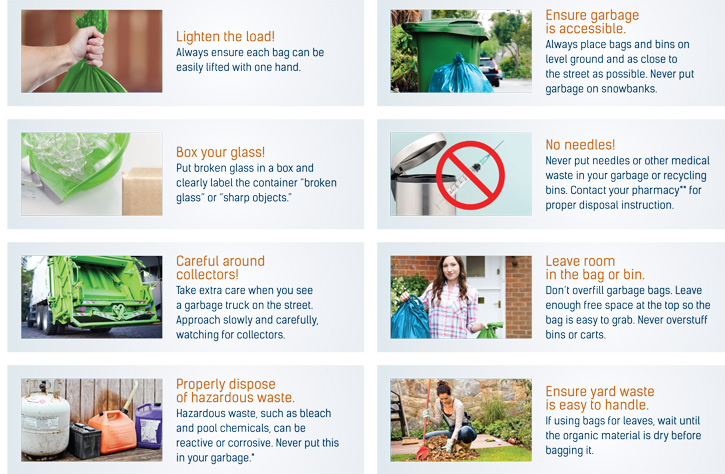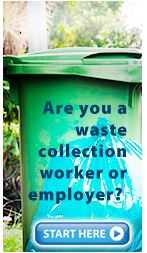


Read the tips!
 |
 |
* Most regions have household hazardous waste depots. If you’re unsure of what garbage is hazardous, or how to safely dispose of hazardous waste, check with your regional solid waste organization or regional service commission.
** You may also contact your regional solid waste organization or regional service commission for proper disposal instruction.
Ammunition does not belong in garbage bags or bins. Contact your local policing agency for proper disposal instruction.
Never put ashes in your household garbage or compost/organics cart. Check with your regional solid waste organization or regional service commission for disposal recommendations.
Bag weight restrictions vary by region. Many cities have a limit of 20 kg (44 lbs). Because your waste collector can lift several tonnes of garbage each day, consider using two or more lighter bags instead of one large heavy bag. Always ensure each bag can be easily lifted with one hand. Check with your municipality or local service district about your specific restrictions.
Check with your municipality or local service district about your specific restrictions as bin weight and size restrictions vary by region. These often depend on whether your collector manually picks up bins or uses mechanical devices. Never use a large bin designed for mechanical pickup when your garbage is handled manually. These large bins are not designed to be safely lifted by your waste collector. Generally, for manual pickup, cans or bins should hold no more than 100 litres and have fixed, non-swiveling handles.
Never use bleach on bags and bins to discourage pests. It can be harmful to your waste collector, especially if it reacts with other substances. See also Hazardous Waste.
If you use bungee cords to secure carts or bins, remove them before bringing the cart or bin to the curb. These can injure your waste collector’s hands, arms and face.
Driveways and roadways are your waste collector’s job site. Take extra care when you see a garbage truck on the street. Approach slowly and carefully, watching for collectors.
Your waste collector needs to access your garbage safely. Ensure your garbage bins or bags are easy to reach and move. Always place bags and bins on level ground and as close to the street as possible. Never place garbage on or near broken pavement or other tripping hazards. In winter, or during freeze-thaw cycles, ensure your collection area is clear of ice and other slipping hazards. Use sand or salt when necessary. Never place garbage on snowbanks or near downspouts and sump pump discharge pipes. In the summer, trim back any trees or bushes near your collection site and remove any wasp or hornet nests.
If your garbage is picked up by a hydraulic cart tipper (lifting device) on a side-load truck, you can help your waste collectors by facing the front of your bin toward the street. This will reduce their pushing and pulling movements. Some bins have arrows on the lid indicating the direction they should be placed.
Food waste can attract raccoons, skunks, mice, birds and other wild animals, which can spread disease. Follow procedures set by your region. If food waste is incorporated in your regular household garbage, ensure it is secure. Only put your garbage out on collection day. If it’s necessary to put it out the night before, cover it securely with a blanket or other protective item. Never use cinder blocks to cover blankets, cans or bags. Moving these can cause excessive lifting and twisting movements by your waste collector.
Household hazardous waste can be dangerous to your waste collector as it may be corrosive, flammable, poisonous or reactive. Do not put hazardous waste, such as bleach, batteries, kerosene, compact fluorescent light bulbs, gasoline, pool chemicals and propane tanks and cylinders, in your household garbage. Most regions have household hazardous waste depots. If you’re unsure of what garbage is hazardous, or how to safely dispose of hazardous waste, check with your regional solid waste organization or regional service commission. See also Bleach.
Don’t overfill garbage bags. Leave enough free space at the top so the bag is easy to grab. Never overstuff bins or carts. Your waste collector should be able to empty contents easily without requiring additional bending, reaching and pulling. See also Ensure Bags and Bins are Accessible, Left of the Driveway and Never on Snowbanks.
Place your garbage on the left-hand side of your driveway (facing the street). By placing your garbage on the left-hand side, the truck is more likely to stop in the centre of your driveway where footing for your waste collector tends to be safest (especially in winter).
Never put hypodermic needles, syringes, lancets and any other sharp items used in home medical care in your household garbage. Never put needles in blue bags or recycling bins. They are not recyclable. Recycled material is often hand-sorted by workers, and you could risk their health. New Brunswick does not have a formal province-wide program for the disposal of household medical waste. Many pharmacies, however, offer take-back programs. They also provide a case to safely return your needles. Contact your pharmacy, regional solid waste organization or regional service commission for your requirements.
Never put needles in blue bags or recycling bins. They are not recyclable. Recycled material is often hand-sorted by workers, and you could risk their health. New Brunswick does not have a formal province-wide program for the disposal of needles. Many pharmacies, however, offer take-back programs. They also provide a case to safely return your needles. Contact your pharmacy, regional solid waste organization, or regional service commission for your requirements.
Do not place your garbage bags or cans on snowbanks. If your waste collector has to climb a bank to get to your garbage, there is a risk of a slip and fall. It also causes excessive reaching and pulling movements. See also Face Bin Toward the Street / Leave Room in the Bag or Bin.
Avoid parking your vehicle on the street on collection day. This ensures waste collectors are not forced to pull bins or carry cans and bags long distances.
Sharp objects, such as glass, nails, sheet metal scraps and broken mirrors, can cause cuts and infection. Keep your waste collector safe by properly preparing these items for collection. Place sharp objects in a corrugated box or other puncture-proof container and safely secure contents. Clearly label the container “broken glass” or “sharp objects.” Some regions prefer that this box be placed separate from garbage bags and bins while others require the box to be bagged. Check with your municipality or local service district for specific instructions. Never put needles in household garbage or recycling bins. See also Needles.
Yard waste, such as leaves, brush and branches, can be difficult for your waste collector to lift and handle. If using bags for leaves and small brush, wait until the organic material is dry before bagging it. Like all household garbage, ensure the bag and its contents can be easily lifted with one hand. Preparation requirements vary by region so check with your municipality or local service district about your specific restrictions.
Additional resources
Watch video – Your garbage isn’t the only thing I pick up (YouTube)
Watch video – WorkSafeNB staff talk about the safe waste collection initiative (YouTube)
Print tip sheet for your home (8.5” x 11”)
Print poster (8.5” x 11”)
Print all tips (8.5” x 11”)
Order poster (11” x 17”)
Order mail insertions (3.33” x 8.5”). Please call 506 632-2223 or 1 800 999-9775 or email us.